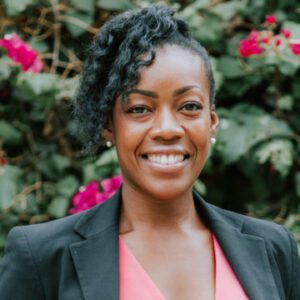 As a FUSE Executive Fellow, Patrice Berry (2018-20) worked with the Oakland Mayor’s Office to institute innovations and technology that empower young adults, giving them access to the resources they need to prepare for postsecondary education. In this role, she trained and educated counselors, advisors, students, and families on key resources, helped Oakland launch its multi-million-dollar digital divide initiative, and supported the development of a policy that enables schools and districts to apply for an extension for the state financial aid application during moments of crisis or emergency.
As a FUSE Executive Fellow, Patrice Berry (2018-20) worked with the Oakland Mayor’s Office to institute innovations and technology that empower young adults, giving them access to the resources they need to prepare for postsecondary education. In this role, she trained and educated counselors, advisors, students, and families on key resources, helped Oakland launch its multi-million-dollar digital divide initiative, and supported the development of a policy that enables schools and districts to apply for an extension for the state financial aid application during moments of crisis or emergency.
Since the conclusion of her fellowship, Patrice has continued to work with the Oakland Mayor’s Office as an Executive Advisor where she heads their postsecondary and workforce success strategy. She is also the Co-Founder of AssistHub, a tech-based platform that assists Californians with obtaining public benefits and other resources. Additionally, she holds board roles with Hack the Hood, Moneythink and Mount Tamalpais College.
What was the impact of the FUSE fellowship on you, professionally and personally?
FUSE was the best decision I ever made. The fellowship came at a time when I was at a fork in my career road: I was considering whether to remain in nonprofit leadership or make the pivot to government that I had always envisioned. I really care about the students and families with whom I’ve had the privilege of working, but I didn’t know how to move into systems-level work. Victoria invited me to be courageous, and I haven’t looked back since.
Government has been an opportunity to center students, families, and community in a different way. The work that I am doing now is really about inserting their voices into the decisions that affect their lives.
The FUSE experience itself was amazing. Orientation prepared me well for my fellowship term, so the situations I encountered in the field weren’t entirely new or surprising. The cohort model was also very important; we had backgrounds in many different sectors, but none of us felt alone. Even now, I remain close to Marsha Murrington, who still works with me in the City of Oakland, and we consult with each other about approaches and decisions. I had a conversation earlier today with another member of my cohort, Danielle Elkins in Minneapolis, and we left with an action plan for how we can help each other.
What are the big challenges on which you are working now, what are you hoping to achieve in the next 6-12 months, and how has your FUSE experience prepared you to approach them?
Through my work with Oakland Mayor Libby Schaff, I am leading the development of AssistHub, a virtual assistant that reduces the time and stress it typically takes to access public benefits and other financial support. These benefits are crucial to helping families both address emergency situations and establish longer-term financial security and economic mobility. We are right now building the beta version of a dynamic, user-friendly platform that can assess a family’s household circumstances and geographic location, and then process the dozens of possible benefits to provide them with personalized recommendations and even individualized coaching, all at times convenient to working parents, college students, and everyone.
When the pandemic happened, I project managed the Oakland Undivided initiative to provide thousands of laptops and Internet access to public school students. At that time, we were already working on an app that could make it easy for college students to access resources like financial aid and food assistance. So we took this existing app, and repurposed it to help students and their families access crisis services and public benefits. Because we discovered so much traction among families across the state of California, we decided to keep going and expand.
Access to public benefits is a monster of a problem. It continues to baffle me that there are so many resources available on paper, but policy choices and bad systems are locking people out of what they need and are entitled to receive. One of the biggest challenges in this work has been to get people to support incremental opportunities for innovation, even if they aren’t the big, radical changes that still need to happen. Full benefits integration (with a single access point and single application for any program at any level) remains the North Star-if not also a guaranteed income, but we can also do a lot of meaningful, transformative things along the path to ensure that we don’t overlook our responsibility to serve people with the dignity they deserve today.
My fellowship experience-listening to the communities and navigating the different personalities of people with positional authority and power-has been really instructive for the work I am doing right now. The skills learned through FUSE that I am using the most right now are relationship cultivation and centering community.
Related work and news:
Sounds Good: Meet The App That Helps People Find Public Benefits
Next City: Giving Underserved Youths a Chance to Succeed Through Better Access to High-Quality Education
